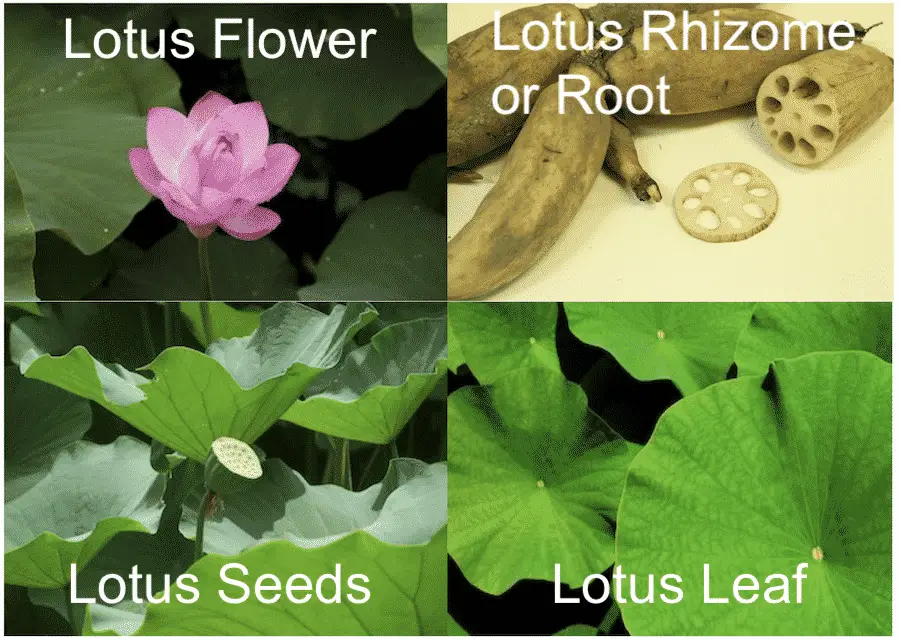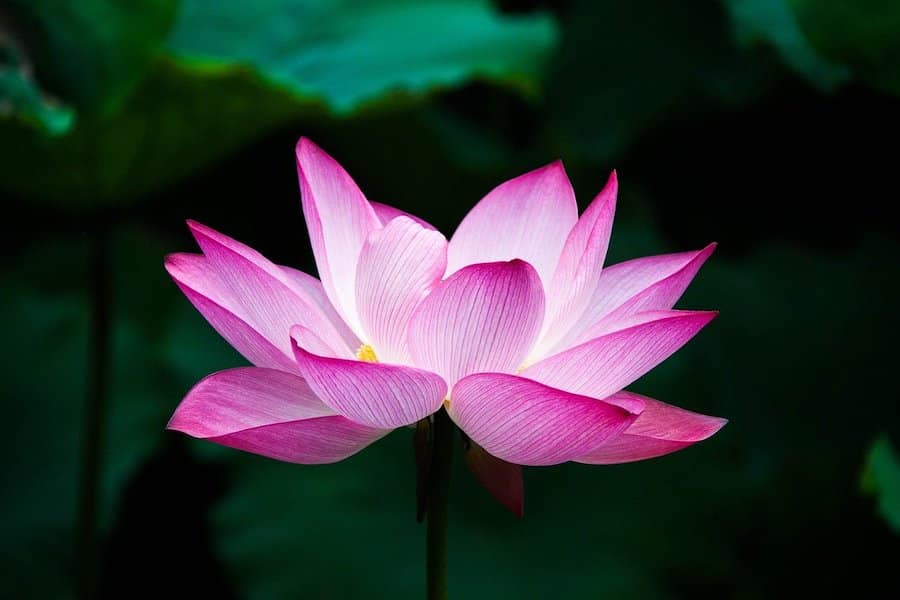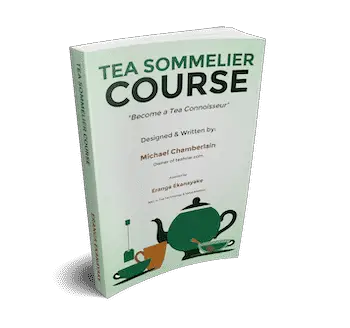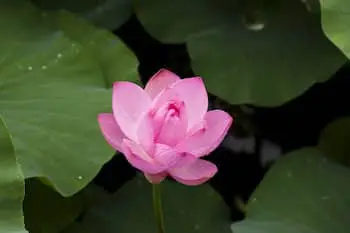In this article, I’m looking at Lotus tea, both lotus tea caffeine levels, which to varying degrees include lotus root, flowers, seeds, and rhizomes benefits too.
As well as the Lotus tea benefits, side effects, and lotus tea taste, along with the guide on what to expect. But first, here’s a quick response on the benefits to help get us started…
Lotus tea contains no caffeine. However, Lotus tea will adopt caffeine from other teas that it is blended with. The ratio of tea blend with the lotus leaves also makes a difference in the amount of caffeine content.
Regarding the health benefits of Lotus tea:
Lotus leaf tea is known for many benefits, these include, collagen generation, de-stressing, and calming effects, regulating healthy blood sugar levels, promoting a healthy digestive system, boosting blood circulation, relieving inflammation and period cramps, and helping with diarrhea
In terms of side effects, Lotus tea poses risks in terms of drug interactions, possible infertility, and potential hypothermia.
That’s the brief summary, more on these shortly, let’s move on to the caffeine levels in Lotus tea, and then the taste of Lotus tea…
Lotus tea caffeine content
A Lotus tea is only an herbal infusion of lotus leaves, flowers, roots, rhizomes, or seeds. Herbal or fruit infusions do not contain any elements from the true tea plant; grown from the Camellia Sinensis.
Those who are avid tea drinkers know any tea originating from the true tea plant will contain caffeine.
But as lotus tea is made from the lotus plant components, it’s only an infusion and not considered as being tea – even though we call it that!
So lotus tea is caffeine-free in its authentic form. Or in other words, an authentic version of lotus tea will only use the lotus and not any actual real tea plant leaves, and therefore does not contain any caffeine.
There is, however, plenty of lotus tea that comes with actual tea mixed or blended.
Lotus tea contains no caffeine. However, how much caffeine in Lotus leaf tea when blended with other teas will depend on the type of tea it’s mixed with. The ratio of tea blend with the lotus leaves also makes a difference in the amount of caffeine content.

Caffeine content comparison for Lotus tea
When you brew lotus tea blends, the amount of tea you add, how long you steep, and so on will also make a great difference in the caffeine content.
To give you a better comparison, here’s the approximate caffeine content of different types of tea for an 8-ounce (230-ml) cup.
Green tea – 25 and 50 milligrams
White tea – 25 30 milligrams
Oolong tea – 30 to 60 milligrams
Rooibos tea – No caffeine
Keep in mind caffeine content can vary, these are approximations only.
The lotus leaf tea blends will however have a lesser caffeine content than the ones stated – because it’s blended with lotus leaves.
But again remember, your selected brewing method can increase the caffeine content too.
See my similar topics on caffeine content in tea…
Green tea caffeine content
Does Chamomile tea have caffeine
Flavor profile of a lotus tea
Here’s a summary of the Lotus tea flavor profile and caffeine before you read on…
Lotus Leaf tea has a very sharp, strong, and subtly sweet flavor with a rich floral aroma. Lotus tea looks pale gold or honey-yellow, even when infused using other parts of the lotus plant. As an herbal infusion, it has zero caffeine, unless it’s blended with true tea varieties.
But keep in mind that this taste profile is only a generalistic description …based on how you make it this can be highly variable.
As well as how you brew it, It also depends on the type of lotus you use. And which part of the plant., The leaves, the roots, the seeds, or the Rhizomes, or even down to whether they’re tender or mature leaves, etc. So the flavors can change.
Originating mostly from Asian cultures, lotus tea – or lotus tea, in general, was considered a special delight.
So people came up with unique brewing techniques to enhance the flavor profile further. One best example is brewing lotus tea in clay pots.
There are also different varieties of clay pots that are used in each culture. For example, the Chinese prefer using a Yixing (Zi Sha) clay pot to brew lotus tea, including lotus leaf and root tea.
The belief was that this brewing method gives lotus tea an exceptional flavor profile. So if you don’t like one brewing method, you can experiment with brewing methods from a different culture. But this may require special tea equipment.
So with the variations available, it’s probably fair to say that lotus tea has a rather versatile flavor profile.

8 Powerful Lotus tea benefits
Lotus leaf tea is known for its many benefits, but here I’ll break down eight of the most potent benefits…
1. Improves collagen generation
Collagen goes a long way towards promoting glowing and vibrant skin.
Collagen also provides elasticity to the skin, making you look young and healthy. Burning fat, building up muscles, and reducing cellulite are some benefits of improved collagen.
2. Helps with de-stressing and gives a deep sense of relaxation
The high vitamin B content in lotus tea helps you de-stress easily.
It also puts pyridoxine into the body. Pyridoxine can directly influence your brain’s neural receptors – which in turn can influence your mental state to a positive, calm, grounded and connected person with a deep sense of relaxation.
These effects can be more effective if you drink lotus tea regularly.
3. Regulates healthy blood sugar levels and blood pressure
The high potassium content in lotus tea helps with these benefits. If you experience any symptoms of high blood pressure, the lotus tea relaxes your blood vessels and increases blood flow.
This lowers blood pressure while regulating blood sugar levels.
4. Supports a healthy digestive function and weight loss
The high fiber content in lotus tea promotes large intestinal peristalsis. This can also support smooth digestion which can, in turn, help remove toxins.
Lotus leaf tea can trigger the secretion of gastric and digestive juices in the intestine. As such, the absorption of nutrients is also more easily facilitated.
Also, the high fiber content in Lotus tea can make you feel full and keep unnecessary snacking at bay, aiding weight loss.
5. Boosts blood circulation
Lotus tea has iron and copper content which is essential for the production of red blood cells. This also goes a long way towards improving blood circulation and improving your energy levels.
Energy levels are always a good thing to tackle in the morning. Consider these 20 best morning teas! Or these teas to boost your energy!
6. Relieves inflammation
Inflammation is an uncomfortable side effect of many conditions, including trauma, chemical exposure, or physical injury. Mixing lotus tea with honey can help you ease a cough that’s related to inflammatory responses.
7. Ease period cramps
Lotus leaf tea and lotus root tea have been used in traditional Chinese medicine for regulating the menstrual cycle and for reducing excess bleeding.
You can learn more about the Chinese Tea diet here.
8. Halts diarrhea
In ancient traditional medicine, the lotus was primarily used for this purpose. But to try it with tea, a lotus leaf tea or seed tea would be ideal.
Try adding lotus leaf tea or seeds in warm water and mixing it with rock sugar. Several antidiarrheal manufactured teas are in fact made with the lotus as well.
Note – Lotus tea also shows a potential benefit with certain types of cancer and acne, but further research is needed to validate this benefit.

Lotus tea side effects
While there are certainly many benefits lotus tea presents, it poses some side effects as well.
If consumed as food or beverage, Lotus is considered to be safe. However, there is insufficient evidence or studies on the lotus to confirm it is safe when used as medicine. Some may experience allergic reactions. This applies to Lotus leaf tea as well as Lotus leaf-based products in general.
1. Drug interactions
In general, there is extra caution required for taking any lotus-based products, certainly with relation to diabetes, high cholesterol, impotence, heart problems, and psychiatric medications.
Taking Lotus tea regularly could potentially pose a risk of adverse side effects through drug interactions.
So the same caution should be applied with lotus leaf tea as well as all Lotus-based products, as they all tend to carry the same properties from the Lotus plant.
For Example – Pentobarbital is a medication that causes sleepiness and drowsiness. Some are concerned that taking lotus tea along with pentobarbital might cause too much drowsiness.
Be sure to consult with your doctor as to whether you can consume lotus tea while taking these medications or any other supplements you may be taking.
2. Possible infertility
According to a study, a lotus seed extract inhibited the production of progesterone in mice. This resulted in creating a contraceptive effect.
It’s unknown if the same effects apply to lotus tea or anti-diarrhea tea made with lotus seeds. And there is insufficient or reliable information about the safety of lotus tea for pregnant or breastfeeding mothers.
Therefore, it’s recommended that those planning to become pregnant, or who are pregnant or even breastfeeding should consult a doctor before consuming lotus tea.
3. Potential hypothermia
According to the study, an alcohol-based extract of lotus stalks tested on rats, caused a drop in their body temperature. This drop lasted for 3-6 hours and varied depending on the dose the rats received.
Hypothermia is a condition in humans where the body temperature drops to dangerous levels. Such drastic body temperature drop can even instigate dysfunctional organs, or could even be fatal.
So specifically avoiding lotus tea made with lotus stalks is recommended as it presents potential Hypothermia risks.
With such complexities, the same caution may be applied to lotus leaf tea as well, to be on the safe side. But of course, more research is needed to validate this – and to know at what doses can such risks set in.
Personally, I don’t think this should scare you off trying Lotus tea, but it’s worth keeping them in mind. And remember there are Lotus tea benefits too.
4. Other uncertain side effects
Lotus tea may cause low blood sugar (hypoglycemia), so particularly for those with diabetes, this is something to watch out for.
Also, Lotus tea may also interfere with blood sugar control during and after surgical procedures.
It’s recommended that you stop taking lotus leaf tea at least 2 weeks before and after surgery. As always, consult your doctor on this point.
And more about tea…
I hope this has answered all your questions regarding lotus tea benefits. If you’re getting into tea more, then why not check out my Tea Sommelier Course, and easily become the tea expert among your friends and family.

Take the fast track and become a tea connoisseur
Whether for enjoyment or considering a career as a tea sommelier. This course has everything you need to enhance your tea knowledge and tea-tasting skills.
This course keeps it simple with step-by-step tea tasting and easy reference guides
For pleasure, or as a precursor to a career in the tea industry. Find out what tea sommelier actually does, their career paths, and what they earn.

Find out more about the Teahow Tea Sommelier Course!
Find out more about the Teahow Tea Sommelier Course!
